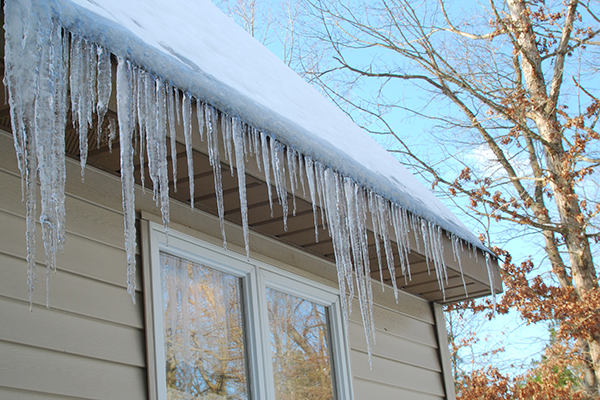
One of the hallmarks of poor insulation in the attic is the formation of icicles under the eaves. These icicles are the product of an “ice dam”, a ridge of ice that forms one to two feet above the edge of the roof, preventing water from flowing off into your home’s eavestrough.
This water, unable to escape, pools against your home’s roofing material, which is somewhat porous and becomes waterlogged. The freeze/thaw cycle that happens when the roof gets warmer in the day and cools again at night will damage your shingles and the roof underneath, and cause a leak. Leaks caused by ice dams generally happen right at the corner between the ceiling and the wall, with the water running down both sides of the interior wall – in your house, and between your walls. Water damage is no joke.
You might think that the problem is with the roof, but it’s not. Ice dams are actually caused by poorly insulated attics. Warm air from the interior of the house warms the underside of the roof, melting snow and causing water to run off. Once the water runs down to the point where the exterior wall of the house cuts off the upward flow of heat, it freezes again, causing the dam to form. The problem will get worse over time, as dams forming and melting will break down the roofing surface, and push the eavestroughs away from the fascia board.
Ice damming is relatively common, especially in the cold climate we have here in Winnipeg, and with winters that have higher than normal snowfall. Half-storey houses, with sloped-ceiling areas that often have very poor original insulation, are particularly susceptible to ice dams. Hip-roof houses (eavestroughs go all the way around the house) are also prone to ice dams, particularly if there is very little, if any, soffit ventilation.
There are short-term solutions (like rakes to remove snow from the roof, and socks full of snow melt to cut through the dam), but they’re not really effective, and using them for prolonged periods will likely result in the formation of more ice dams, and further damage. The only long-term cure for ice damming is to improve attic ventilation, and to stop warm air from coming into contact with the underside of the roof. You need to evaluate your attic insulation, and may need to add more. You can use fiberglass batts, blown-in cellulose insulation, or spray-foam.
To stop ice dams from forming on your roof (and save some money in energy costs) consult the insulation professionals at Above All Insulation today.